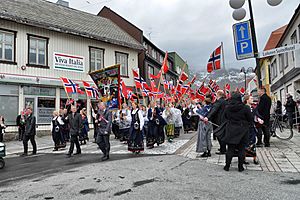National identity facts for kids
National identity is how a person feels they belong to a country or a group of people who share a common culture. It's like feeling connected to your nation because of its special traditions, language, and way of life. This feeling can be strong even if you don't have legal citizenship in that country. It's about knowing "we" are different from "they." National identity also includes people from many different backgrounds in one country who share a common feeling of belonging.
This sense of belonging often comes from things we see and do every day. These include national symbols (like flags), the language we speak, our country's history, and cultural things like music and food.
When someone shows their national identity in a good way, it's called patriotism. This means having pride and love for your country. But if this feeling becomes too extreme, it can turn into chauvinism. This is when someone believes their country is much better than all others and is overly loyal.
Contents
How National Identity Forms

National identity isn't something you're born with. It's something we learn and build as we grow up. It comes from the "common points" in our daily lives. These include national symbols, languages, colors, our nation's history, and shared culture. Things like music, food, radio, and TV also play a part.
As we experience these things, we start to include national identity into who we are. We adopt beliefs, values, and ideas that match our nation's identity. People who strongly identify with their nation see its beliefs and values as important to them. They often show these beliefs in their daily lives.
Many experts divide national identity into two main types: civic and ethnic.
- Ethnic nationalism focuses on shared stories of ancestors, family ties, and similar language or religion.
- Civic nationalism focuses on sharing a common homeland and being part of its society. It creates a shared culture that all citizens can embrace.
Some scholars believe that civic nationalism is found in countries with well-developed cultures. These nations can work together with others based on respect. Ethnic nationalism, however, is sometimes seen in less developed nations. It can lead to feelings of not being good enough and even cause aggressive actions.
There are three main ways experts define national identity:
- Essentialists think national identity is fixed. It's based on things like ancestry, common language, and shared history.
- Constructivists believe that politics and power play a big role. Strong groups use their power to create and keep their special place in society.
- The civic identity school focuses on shared values. These include ideas about rights and the fairness of government rules.
Some studies also show how popular culture, like music, can make ethnic identity stronger. It can increase a feeling of pride in one's background.
What National Identity Means
A political scientist named Rupert Emerson said that national identity is "a body of people who feel that they are a nation." Another social psychologist, Henri Tajfel, agreed with this idea. He helped create the Social identity theory. This theory says that national identity includes two parts:
- Self-categorization: This means seeing yourself as part of a nation.
- Affect: This refers to the feelings you have about this connection. It's like a sense of belonging or emotional attachment to your nation.
Just knowing you belong to a certain group can bring positive feelings. It can also make you want to act for that group, even if you don't know everyone in it.
National identity involves seeing yourself as part of your nation (the "in-group"). It also means seeing others as part of different nations (the "out-groups"). When people recognize shared things like a common past or future, they feel connected to their nation. At the same time, they see people from other nations as "out-groups."
Some theories suggest that identifying with your nation might lead to looking down on other nations. However, many studies have found that feeling connected to your national identity doesn't always mean you will dislike other groups.
National identity brings positive feelings like pride and love for your nation. It also creates a sense of duty toward other citizens. When people learn about national pride and how special their country is, it can help different groups within the country get along. For example, in the U.S., different ethnic groups are united by the idea of being American. This shared national pride helps reduce conflicts between them.
When National Identity Becomes Strong
National identity can become most noticeable when a country faces a challenge. This could be an outside enemy, problems inside the country, or natural disasters. For example, after the terrorist attacks on September 11, 2001, in the U.S., many Americans felt a stronger sense of national identity and patriotism. Having a common threat or goal often brings people together and makes national identity stronger.
Sociologist Anthony Smith believes that national identity can last for many generations. When people share stories of a common past and future, their sense of belonging to a nation grows. However, national identities can change over time. If more people live in foreign countries for a long time, their national identity might weaken. It can also be challenged by "supranational identities." This means identifying with a larger group that includes people from many nations.
For example, American students studying abroad sometimes find it hard to connect with their host country. This is because of stereotypes about American identity. These ideas can affect how people from different backgrounds understand and accept each other.
National Consciousness
National consciousness is a shared feeling of national identity. It's a common understanding that a group of people shares a similar background, language, or culture. Historically, a rise in national consciousness has often been the first step toward creating a nation.
It's about knowing that without "them" (the collective group), there is no "us." It's being aware of the many shared attitudes and beliefs about things like family, customs, and roles in society. This awareness helps people have a "collective identity." It helps them understand how important their surroundings and the people around them are in making up a nation. Simply put, national consciousness is a set of attitudes that shape how people view life.
In Europe and the Americas, national identities grew along with the idea that political power belongs to the people of a state. In Eastern Europe, it was often linked to ethnic background and culture. Nationalism first needs national consciousness. This is the awareness that a group of people, or a nation, shares common traits. National heroes and symbols often help awaken this national consciousness.
National identity is a shared creation. Through learning and growing up, a system of beliefs, values, and expectations is passed down to group members. The shared parts of national identity can include national symbols, traditions, and memories of national experiences and achievements. These shared elements are deeply rooted in the nation's history. How much an individual is exposed to this system affects how much they take on national identity. These shared elements can become important parts of how a person defines themselves and sees the world.
Famous Ideas About Nations
Benedict Anderson
Benedict Anderson believed that nations are "imagined communities." This means a nation is something people create in their minds. It's made up of individuals who see themselves as part of a specific group. Anderson thought nations were "limited" because they have boundaries. These boundaries decide who is in and who is out. He believed nations work by including some and excluding others.
Anderson also thought nations were "sovereign." This means they are free from old religious traditions. Sovereignty helps organize a nation while keeping it free from religious pressures.
Ernest Gellner
Unlike Anderson, Ernest Gellner didn't think nations were "imagined communities." He believed nations were completely modern creations and a result of nationalism. Gellner thought nations came about because of the Industrial Revolution. When many people from different backgrounds moved to cities, they needed a common identity. As capitalism grew, there was a need for constant new training. Gellner thought this need was met by creating a shared past, culture, and language, which led to the birth of nations.
Gellner said that our idea of a nation is like this:
- Two people are from the same nation only if they share the same culture. Culture here means a system of ideas, signs, and ways of communicating.
- Two people are from the same nation only if they recognize each other as being part of the same nation.
It was this recognition of each other as being "of the same kind" that made them a nation, not just their shared traits.
Paul Gilbert
In his book "The Philosophy of Nationalism," Paul Gilbert explains his ideas about what a nation is. His ideas are different from both Anderson and Gellner. Gilbert says nations are many things:
- Nominalist: Whatever a group of people who call themselves a nation say a nation is.
- Voluntarist: A group of people who are connected by a nation they commonly want to be part of.
- Territorial: A group of people who live close to each other, in the same area.
- Linguistic: People who speak the same language.
- Axiological: A group of people who have the same special values.
- Destinarian: A group of people who share a common history and a common goal.
Challenges to National Identity
Ethnic Identity
In countries with many different ethnic groups, ethnic identity and national identity can sometimes clash. These conflicts are often called ethno-national conflicts. One example is the struggle between the Australian government and the Aboriginal people in Australia. The Australian government often favored European-based cultural values and English as the national language. Aboriginal cultures and languages were not supported and were almost lost in the 20th century. Because of these conflicts, many Aboriginal people feel less connected to the national identity of being Australian. Instead, their ethnic identities are very important to them.
Immigration
As more people move between countries, many nations face challenges in building national identity and welcoming immigrants. Some countries are more open. For example, Canada encourages immigrants to feel a sense of belonging. It has created a more inclusive idea of national identity that includes both people born in Canada and immigrants.
Other countries are less open. For instance, Russia has had large numbers of immigrants. Immigrants were sometimes seen negatively by Russian people. They were viewed as "unwelcome guests." These immigrants were often seen as outsiders and were not included in the national identity of belonging to Russia.
Globalization
The world is becoming more connected through globalization. This means more international travel, communication, and business. People cross national borders more often for cultural exchange, education, business, and different ways of life. Globalization promotes shared values and experiences. It also encourages people to identify with the global community. People might adopt cosmopolitanism and see themselves as world citizens. This trend can challenge national identity because it makes being a citizen of one specific country seem less important.
Some researchers have looked at how globalization affects national identity. They found that as a country becomes more globalized, patriotism can sometimes decline. This suggests that more globalization might lead to less loyalty and less willingness to fight for one's country.
When Identities Clash
Sometimes, a person's national identity can feel different from their legal citizenship. For example, many Israeli Arabs feel they belong to the Arab or Palestinian nationality. At the same time, they are citizens of Israel, which is in conflict with the Palestinian nationality.
Taiwanese people also face this kind of conflict. There have been movements to formally declare "Taiwan Independence" and change the name "Republic of China" to "Republic of Taiwan." People in Taiwan are given ID cards and passports under the name "Republic of China." However, some of them do not identify with "Republic of China" but rather with "Republic of Taiwan."
What Makes Up National Identity?
National identity markers are the traits used to show that a person has a certain national identity. These markers are not always the same. They can change from culture to culture and even within a culture over time. Such markers might include a common language, national clothing, birthplace, or family connections.
See also
 In Spanish: Identidad nacional para niños
In Spanish: Identidad nacional para niños
- Cosmopolitanism
- Culture of the United States
- Ethnic group
- Ethnocentrism
- Globalization
- Identity (social science)
- Indonesian National Awakening
- Identity crisis
- Nationalism
- Patriotism
- Social identity theory
- Global citizenship
- Volkstum
- Volksgeist
 | Emma Amos |
 | Edward Mitchell Bannister |
 | Larry D. Alexander |
 | Ernie Barnes |




